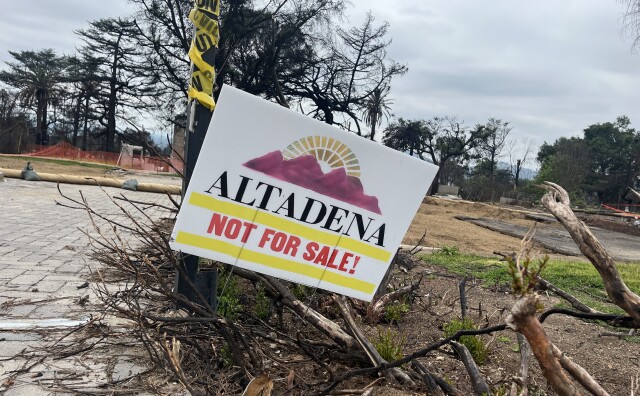With our free press under threat and federal funding for public media gone, your support matters more than ever. Help keep the LAist newsroom strong, become a monthly member or increase your support today.
7 Found Killed At Alleged Illegal Pot Grow House In Riverside County

The Riverside County Sheriff’s Department is investigating the murders of seven people at a home that it says was the site of "a major organized crime type operation" to grow illegal marijuana. Sheriff Chad Bianco has asked federal law enforcement to assist in the investigation.
Around midnight on Monday, the department says deputies responded to a report of assault with a deadly weapon at a residence in the 45000 block of Highway 371 in the unincorporated area of Aguanga, less than 20 miles east of Temecula.
They found an adult female suffering from gunshot wounds; she was rushed to a hospital but died. Six other shooting victims were found dead at the scene.
The department said it has yet to locate any suspects.
Authorities said they found several hundred marijuana plants and more than 1,000 pounds of marijauana at the property, which had multiple makeshift dwellings and buildings, Bianco said.
At a news conference Tuesday, Bianco said the complex had "a nursery type place, where they were growing plants. There were places to dry the plants. There were places to process the plants ... This was not a small operation, this was a very organized crime type of operation."
All the people on site who were potential witnesses or victims were Laotian, the sheriff added.
A lot of the cars parked at the house were registered in various states, said Bianco, who said he requested federal help because "this is not going to be an easy investigation" and it will likely span multiple states.
By some measures, illegal cultivation hasn’t slowed since marijuana was legalized in California. Some analysts say high taxes and tough licensing rules make it hard to turn a profit selling legal pot.
One measure is the Campaign Against Marijuana Planting, an annual July-September state effort to eradicate illegal marijuana farms on public and private lands. It's on track to seize its one millionth plant of 2020 by the end of this week, said Jack Nelson, a regional operations commander for the California Department of Justice. That’s compared with about 600,000 in 2016, he said.
This story has been updated.
At LAist, we believe in journalism without censorship and the right of a free press to speak truth to those in power. Our hard-hitting watchdog reporting on local government, climate, and the ongoing housing and homelessness crisis is trustworthy, independent and freely accessible to everyone thanks to the support of readers like you.
But the game has changed: Congress voted to eliminate funding for public media across the country. Here at LAist that means a loss of $1.7 million in our budget every year. We want to assure you that despite growing threats to free press and free speech, LAist will remain a voice you know and trust. Speaking frankly, the amount of reader support we receive will help determine how strong of a newsroom we are going forward to cover the important news in our community.
We’re asking you to stand up for independent reporting that will not be silenced. With more individuals like you supporting this public service, we can continue to provide essential coverage for Southern Californians that you can’t find anywhere else. Become a monthly member today to help sustain this mission.
Thank you for your generous support and belief in the value of independent news.

-
The Palisades Fire erupted on Jan. 7 and went on to kill 12 people and destroy more than 6,800 homes and buildings.
-
People moving to Los Angeles are regularly baffled by the region’s refrigerator-less apartments. They’ll soon be a thing of the past.
-
Experts say students shouldn't readily forgo federal aid. But a California-only program may be a good alternative in some cases.
-
Distrito Catorce’s Guillermo Piñon says the team no longer reflects his community. A new mural will honor local leaders instead.
-
The program is for customers in communities that may not be able to afford turf removal or water-saving upgrades.
-
More than half of sales through September have been to corporate developers. Grassroots community efforts continue to work to combat the trend.







